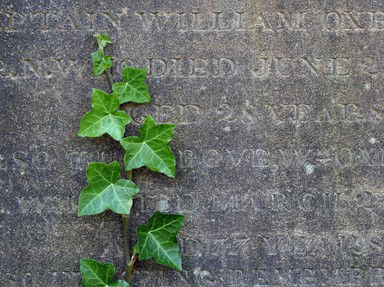Quiz Answer Key and Fun Facts
1. Any man's death diminishes me/ Because I am involved in mankind/ And therefore never send to know for whom the bell tolls/ It tolls for thee.
2. Though nothing can bring back the hour/ Of splendour in the grass, of glory in the flower/ We will grieve not, rather find/ Strength in what remains behind.
3. Good men, the last wave by, crying how bright/ Their frail deeds might have danced in a green bay/ Rage, rage against the dying of the light.
4. Dying/ Is an art, like everything else/ I do it exceptionally well/ I do it so it feels like hell/ I do it so it feels real/ I guess you could say I've a call.
5. Consume my heart away; sick with desire/ And fastened to a dying animal/ It knows not what it is; and gather me/ Into the artifice of eternity.
6. This be the verse you grave for me/ Here he lies where he longed to be/ Home is the sailor, home from sea/ And the hunter home from the hill.
7. The curfew tolls the knell of parting day/ The lowing herd wind slowly o'er the lea/ The plowman homeward plods his weary way/ And leaves the world to darkness and to me.
8. A current under sea/ Picked his bones in whispers. As he rose and fell/ He passed the stages of his age and youth/ Entering the whirlpool.
9. When great souls die/ The air around us becomes/ Light, rare, sterile/ We breathe, briefly.
10. Since then -'tis Centuries - and yet/ Feels shorter than the Day/ I first surmised the Horses' Heads/ Were toward Eternity-
Source: Author
LadyNym
This quiz was reviewed by FunTrivia editor
looney_tunes before going online.
Any errors found in FunTrivia content are routinely corrected through our feedback system.
